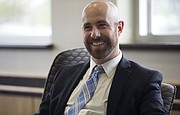Governor visits Cd'A, comments on crisis center, legislature
COEUR d'ALENE — Although it only opened four months ago, Gov. Butch Otter said the Northern Idaho Crisis Center has already had a positive impact on the community.
"We've got a tremendous story to tell now," Otter said. "And we need to tell that story every chance we get."
Otter received a full report on the status of the center from local officials and board members during a meeting at Kootenai Health Wednesday. The stop was one of many the governor made alongside Rep. Luke Malek, R-Coeur d'Alene, during his trip to the Lake City.
Don Robinson, Crisis and Intervention Services Manager at the Northern Idaho Crisis Center, gave Otter a breakdown of how the center has been operating, and the impact it has had, since opening its doors. Robinson said, although it is challenging to quantify the exact cost savings of the center to other entities, the anecdotal evidence suggests the center has been effective.
"I can't tell you how many calls we've gotten from somebody who said they would have killed themselves if they hadn't visited us," Robinson said.
Kootenai County Sheriff Ben Wolfinger, who also serves on the board of the crisis center, added to Robinson's anecdotal evidence by stating that, in the past, his deputies would often visit the same individuals or families every week. But, with the opening of the crisis center, Wolfinger said those mental health calls have lessened.
"My guys are just ecstatic about it," he added.
Throughout the meeting, Otter asked many specific questions about how the center operates and how many patients it has seen. He encouraged the officials and board members in attendance to continue to provide his office with data on the center.
"We are driven by data. So when we find a demographic of citizens that are needful of attention, the data has got to drive us to the investment," Otter said. "And public policy has got to drive the investment in order for us to have accountability."
Otter also visited Coeur d'Alene Fire Station 1, where he signed the Firefighters Presumptive Illness Cancer Bill, which adds certain types of cancer to the state's workers' compensation law. Malek, who authored the bill, told The Press there were several individuals in attendance at the signing who could have used the law when they were serving as a firefighter.
"But instead they had long fights over whether their cancer was caused by firefighting," he added.
The law, Otter said, shifts the burden of identification and proof away from firefighters and first responders in the event they are diagnosed with cancer. With the passage of the bill, Otter said the burden of proof will now be for "the other side" to prove the cancer was not caused by firefighting.
"Nobody exposes themselves to this stuff on purpose with one exception — firefighters," Otter said. "Now the next generation of firefighters will know that the only real battle they have to engage in is protecting private property from fire. They are not going to have to go battle the medical institutions in order to get the help they need."
The governor began his day at the Bakery by the Lake, where he drank coffee and visited with members of the community. Malek said many of the questions focused on what the governor thought of the 2016 legislative session.
Otter added he was happy to hear and field questions related to his education plan, specifically with the value residents are placing on having a plan that looks toward the future through workforce development.
"There's going to be a lot of security as a result of that workforce development," Otter said. "Capital is going to go to a place where it's secure and predictable in its return. There's more predictability and security in Idaho now than there's ever been."
There were some battles fought over education, he added. But Otter praised the leadership of Malek during the session in ensuring the work got done.
"You hear all these guys talking about 'I voted against this, I voted against that,'" Otter said. "Big deal. What did you do to correct it? Last year you said you voted against it for this reason or that reason. OK, did you come back with a bill and say 'Here's what we should have done?' Well Luke does that."
Otter used the lack of legislative support for the crisis centers during the 2015 session as an example of the attitude he is observing.
"They are stupefied by the cost and totally incapable of seeing the value. For a public servant that is almost unforgivable," he said. "It shouldn't be acceptable to anybody anymore just to hear the answer to a public policy question as 'No.' OK what are you going to do about it then?"
"Especially if you agree that there's a problem and we're not hearing any disagreement that we're dealing with problems," Malek added.
Otter also attended a campaign event for Malek in Coeur d'Alene.



